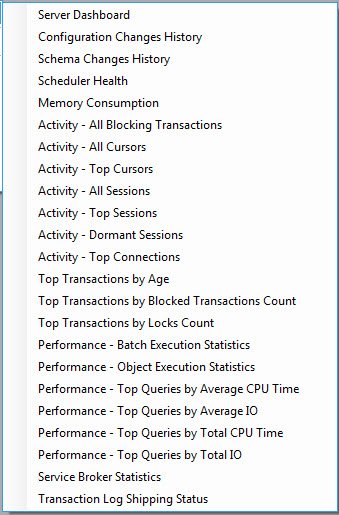SQL Server management Studio 2008 is a wonderful tool and has many different features. Many times, an average user does not use them as they are not aware about these features. Today, we will learn one such feature. SSMS comes with many inbuilt performance reports and activity reports, but we do not use it to the full potential.
Let us see how we can access these standard reports.
Connect to SQL Server Node >> Right Click on it >> Go to Reports >> Click on Standard Reports >> Pick Any Report.

You can see there are many reports, which an average users needs right away, are available there. Let me list all the reports available.
- Server Dashboard
- Configuration Changes History
- Schema Changes History
- Scheduler Health
- Memory Consumption
- Activity – All Blocking Transactions
- Activity – All Cursors
- Activity – All Sessions
- Activity – Top Sessions
- Activity – Dormant Sessions
- Activity – Top Connections
- Top Transactions by Age
- Top Transactions by Blocked Transactions Count
- Top Transactions by Locks Count
- Performance – Batch Execution Statistics
- Performance – Object Execution Statistics
- Performance – Top Queries by Average CPU Time
- Performance – Top Queries by Average IO
- Performance – Top Queries by Total CPU Time
- Performance – Top Queries by Total IO
- Service Broker Statistics
- Transactions Log Shipping Status

In fact, when you look at the above list, it is fairly clear that they are very thought out and commonly needed reports that are available in SQL Server 2008. Let us run a couple of reports and observe their result.
Performance – Top Queries by Total CPU Time

Memory Consumption

There are options for custom reports as well, which we can configure. We will learn about them in some other post. Additionally, you can right click on the reports and export in Excel or PDF. I think this tool can really help those who are just looking for some quick details. Does any of you use this feature, or this feature has some limitations and You would like to see more features?
Reference : Pinal Dave (https://blog.sqlauthority.com)





